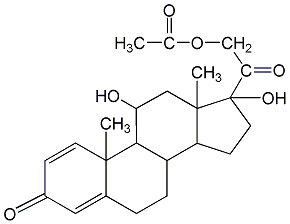
Structural formula
| Business number | 015E |
|---|---|
| Molecular formula | C23H30O6 |
| Molecular weight | 402.49 |
| label |
Prednisolone acetate, prednisone acetate, Dehydrohydrocortisone acetate, 11b,17a,21-Trihydroxypregnant-1,4-diene-3,20-dione-21-acetate, Prednisolone acetate, dehydrocortisol acetate, Predsolone acetate, dehydrocortisol acetate, 21-Acetoxy-1,4-pregnadiene-11?,17?-diol-3,20-dione, Prednisolone 21-acetate, 11?,17?,21-Trihydroxy-1,4-pregnadiene-3,20-dione 21-acetate, 1,4-Pregnadiene-11?,17?,21- |
Numbering system
CAS number:52-21-1
MDL number:MFCD00037710
EINECS number:200-134-1
RTECS number:TU4152500
BRN number:3111798
PubChem number:24898962
Physical property data
1. Properties: colorless crystalline powder. Odorless. Bitter taste.
2. Density (g/mL, 25/4?): Undetermined
3. Relative vapor density (g/mL, air=1): Undetermined
4. Melting point (ºC): 237-239
5. Boiling point (ºC, normal pressure): Undetermined
6. Boiling point (ºC, 5.2kPa): Undetermined
7. Refractive index: Undetermined
8. Flash point (ºC): Undetermined
9. Specific rotation (º): Undetermined Determined
10. Autoignition point or ignition temperature (ºC): Not determined
11. Vapor pressure (kPa, 25ºC): Not determined
12. Saturated vapor pressure (kPa, 60ºC): Undetermined
13. Heat of combustion (KJ/mol): Undetermined
14. Critical temperature (ºC): Undetermined
15. Critical pressure (KPa): Undetermined
16. Log value of oil-water (octanol/water) partition coefficient: Undetermined
17. Explosion upper limit ( %, V/V): Undetermined
18. Lower explosion limit (%, V/V): Undetermined
19. Solubility: Insoluble in water, soluble in ethanol, Slightly soluble in chloroform and acetone.
Toxicological data
1. Acute toxicity: rat subcutaneous LD50: >240mg/kg; mouse subcutaneous LD50: 3500mg/kg 2. Reproductive toxicity: female rat oral TDLo: 1800mg/kg, conception occurs after 2-19 days; femaleRat subcutaneous TDLo: 96g/kg, conception occurs after 11 days; Intravenous TDLo for female mice: 96mg/kg, conception occurs after 11-14 days
Ecological data
None yet
Molecular structure data
1. Molar refractive index: 105.06
2. Molar volume (cm3/mol): 312.5
3. Isotonic specific volume (90.2K ): 855.5
4. Surface tension (dyne/cm): 56.1
5. Polarizability (10-24cm3): 41.65
Compute chemical data
1. Reference value for hydrophobic parameter calculation (XlogP): None
2. Number of hydrogen bond donors: 2
3. Number of hydrogen bond acceptors: 6
4. Number of rotatable chemical bonds: 4
5. Number of tautomers: 6
6. Topological molecule polar surface area 101
7. Number of heavy atoms: 29
8. Surface charge: 0
9. Complexity: 827
10. Number of isotope atoms: 0
11. Determine the number of atomic stereocenters: 7
12. Uncertain number of atomic stereocenters: 0
13. Determine the number of chemical bond stereocenters: 0
14. Number of uncertain chemical bond stereocenters: 0
15. Number of covalent bond units: 1
Properties and stability
None yet
Storage method
This product should be sealed and stored in a cool, dry place.
Synthesis method
It can be produced by dehydrogenating hydrocortisone acetate using microorganisms or selenium dioxide
Purpose
Applicable to rheumatoid arthritis, rheumatic fever, lupus erythematosus, scleroderma, dermatomyositis, acute lymphoblastic leukemia, etc.
extended-reading:https://www.bdmaee.net/high-tin-chloride/
extended-reading:https://www.bdmaee.net/dioctyltin-oxide-2/
extended-reading:https://www.newtopchem.com/archives/799
extended-reading:https://www.bdmaee.net/14-butanediol-bdo-cas110-63-4/
extended-reading:https://www.bdmaee.net/polyurethane-catalyst-smp/
extended-reading:https://www.newtopchem.com/archives/39159
extended-reading:https://www.bdmaee.net/wp-content/uploads/2022/08/Dimethyldecanoic-acid-dimethyl-tin-CAS68928-76-7-Dimethyldineodecanoatetin.pdf
extended-reading:https://www.bdmaee.net/cas-13355-96-9/
extended-reading:https://www.newtopchem.com/archives/44123
extended-reading:https://www.bdmaee.net/dabco-tl-low-odor-tertiary-amine-catalyst-dabco-low-odor-tertiary-amine-catalyst/

